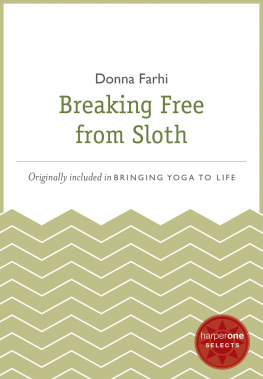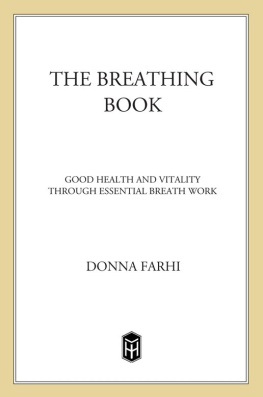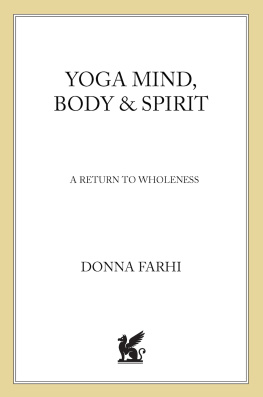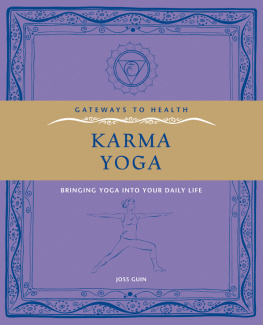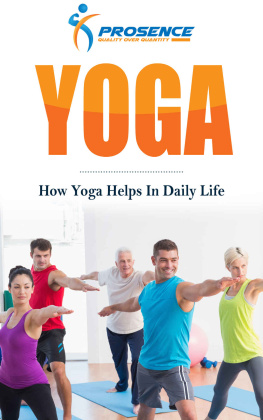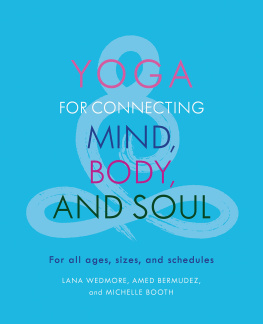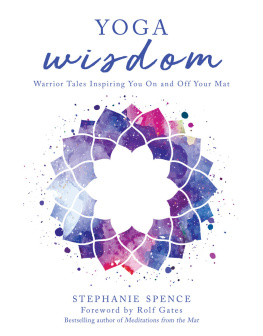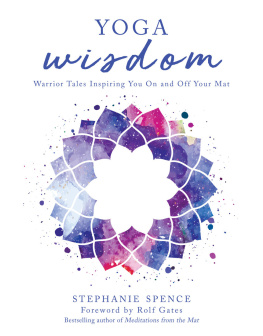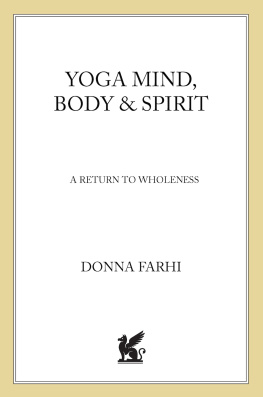Farhi - Breaking Free from Sloth
Here you can read online Farhi - Breaking Free from Sloth full text of the book (entire story) in english for free. Download pdf and epub, get meaning, cover and reviews about this ebook. City: New York, year: 2012, publisher: HarperCollins e-books, genre: Religion. Description of the work, (preface) as well as reviews are available. Best literature library LitArk.com created for fans of good reading and offers a wide selection of genres:
Romance novel
Science fiction
Adventure
Detective
Science
History
Home and family
Prose
Art
Politics
Computer
Non-fiction
Religion
Business
Children
Humor
Choose a favorite category and find really read worthwhile books. Enjoy immersion in the world of imagination, feel the emotions of the characters or learn something new for yourself, make an fascinating discovery.
Breaking Free from Sloth: summary, description and annotation
We offer to read an annotation, description, summary or preface (depends on what the author of the book "Breaking Free from Sloth" wrote himself). If you haven't found the necessary information about the book — write in the comments, we will try to find it.
Farhi: author's other books
Who wrote Breaking Free from Sloth? Find out the surname, the name of the author of the book and a list of all author's works by series.
Breaking Free from Sloth — read online for free the complete book (whole text) full work
Below is the text of the book, divided by pages. System saving the place of the last page read, allows you to conveniently read the book "Breaking Free from Sloth" online for free, without having to search again every time where you left off. Put a bookmark, and you can go to the page where you finished reading at any time.
Font size:
Interval:
Bookmark:
Breaking Free from Sloth
A HarperOne Select
Donna Farhi

Contents
The tragedy of life is not death; rather, it is what we allow to die within us while we live.
Norman Cousins
C all it what you likeidleness, indolence or languor, apathy, or inanimationI know no better word than sloth to describe the habitual disinclination to effort that thwarts the potential of the budding spiritual seeker. The sloth is a bearlike creature given to hanging upside down and moving so slowly that algae gives its brown coat a green tinge. Of the nine obstacles to the yogic path listed in the Yoga-Sutra, four can be attributed in some way to the effects of dullness, laziness, and inertia. Sloth makes it almost impossible to establish a firm ground for practice, and even if we are able to do so, sloth may prevent us from sustaining any ground we have gained. Most of us have a sense of whats good for us. This knowledge of the medicine we need bypasses the central dilemma: How are we going to get to the medicine cabinet?
We all have days when laziness overtakes us. These momentary lulls need be no cause for concern for they are a part of the rhythm of life. When, however, inertia becomes a way of life, then we should take a good look at what is causing us to become passive spectators in our own lives. Even if we are busy, this does not necessarily mean that our actions are purposeful and that we are using our energies wisely. We may be as intransigently stuck in compulsive busyness as in inactivity. We may use our best energy for inconsequential affairsunnecessary shopping, trivial entertainment, and casual socializingand leave the dregs for our marriage, our family and friendships, our lifes work, and the cultivation of our inner life. If we define a Yoga practice as an awareness of and investment in our most cherished values, we may be dismayed to discover how little real energy we designate to the central purpose of our life. So when I speak of a habitual disinclination toward effort, I am speaking specifically about purposeful effort. In what ways are we sabotaging ourselves, and how can we extricate ourselves from the mire of self-indulgence?
All spiritual traditions have one compelling suggestion to remedy inertia and ineffectual action. Consider in the harsh light of day that you are going to die. One dayand no one knows whether that day will be today, tomorrow, next year, or twenty years from nowthe little you will cease to be. If you believe that life on Earth is meant to be a forlorn meal of dried toast and disappointment with the joy and caviar arriving postmortem, then you need not concern yourself with the issue of sloth. If you believe that on your deathbed you will be most concerned about whether you made the right choice of bedroom decor, then read no farther. But if you believe that there is something enduring within you and that the higher meaning and purpose of life is about finding a connection to your inner divinity, then every moment of life will become precious. When you are fully cognizant that at any moment your life could end, you will not wish to waste your time on trivial pursuits or petty grievances. Every moment will offer itself as a possible opportunity for connecting with the only thing you can take with you when you die: your soul. The contemplation of death, therefore, is intended to foster a sense of immediacy and to help us distinguish between what is salient to our very being and what is not. When we can discriminate between those things that are important and those that are not, how we use our time and energy will reflect this understanding.
Many people come to this realization when tending someone who has been incapacitated by illness, after witnessing the premature death of a close friend or family member, or after a close brush with death themselves. Such events often provide the nudge we need to assess whether we would feel complete should death come calling tomorrow. Could we say we are fulfilled? Would we feel that we are serving our purpose in life? Do we love fully, and what do we regret? If we are lucky, something like this happens to us early in our life and lights a fire behind us. We need not wait, however, for such an event to motivate us. While we are healthy and strong, we can consider the undeniable fact of our finite time on Earth. This contemplation of death, so common to all of the worlds spiritual traditions (most notably Tibetan Buddhism), is not intended to be morbid or to impel action through fear or anxiety. Rather, it is intended to help generate a joyous awakening to the life that is available to us, should we choose to participate.
How we use the knowledge of death as a tool for breaking through inertia and awakening to life depends on our attitudes and beliefs. Whether you believe in an afterlife is inconsequential; the important thing is to use the contemplation of death skillfully and to your advantage. As a child I was always fascinated by the TV shows Mission Impossible and Get Smart. I was never sure which I liked betterthe serious venture starting with that ominous catchphrase, Your mission, should you choose to accept it... with fatal portents at every turn, or the improbable shenanigans of Maxwell Smart, Agent 86, and his sidekick, 99, neither of whom seemed to get any closer to death than a bad cold. Who could dislike a character who on being awakened in the middle of the night by a telephone call from the chief and told Were facing a terrible crisis: the possible destruction of the entire world! would reply, Well, couldnt it have waited until the morning? I imagine that Agent 86 came all the closer to our hearts because we see in him some part of ourselves that wants to pretend that the show is never going to end and that we have lots of time to dawdle. When were in the process of trying to find some internal motivation that can break through the inertia of sloth, I believe we need a little dose of both of these characters. We have to believe that there are serious consequences to inaction, but at the same time we need to be able to take ourselves and life lightly. Our Mission Impossible persona must believe that death is an imminent possibility, while our Agent 86 is well aware that its all a bit of hoax and that while our body will die, we can never die. It is a precarious balance: to lean too far in one direction makes the spiritual path one of grim urgency, to lean too far in the other makes our time on Earth a pathetic charade. When we put death in our back pocket, we use the awareness of impermanence like a little burr in our pants to keep us from becoming too complacent.
Yoga is not a fear or shame-based philosophy, for fear rarely succeeds as the catalyst for change. If fear were an effective strategy for change, millions of people would have given up smoking already, since the dire health consequences of cigarettes are well known. Millions more would have extricated themselves from overstuffed couches and gone out exercising, chastely refusing calorific delights. Medical studies have shown that patients with serious heart disease rarely make lifestyle changes out of fear of death but will readily embrace radical lifestyle changes when these changes demonstrate a greater enjoyment and pleasure in life. Clearly, a far greater motivator than fear is joy. And this is what Yoga practice is intended to generate.
The problem here, of course, is that the practice that can generate joy may be the very thing we are resisting. So let us come back to the question of practical significance: How do we break through this initial resistance? It is helpful to note that heaviness, lethargy, and depression are not states of being that anyone finds particularly enjoyable. This honest analysis can lead us to ask, Is this how I want to be, and if not, what am I willing to do about it? To break through such inertia takes a moment of acceleration: that self-generated push from behind that gets our wheels in motion. If you have been stuck for a long time, perhaps your whole life, it will be difficult to generate this acceleration by yourself. You may need a kick-start, a push, or simply a good kick in the pants. If at first you do not have your own internal motivation, then find someone who does: a teacher you can study with, a friend whose self-discipline inspires you, a colleague who has some get-up-and-go. Spend time with such people, and you will find that energy and enthusiasm are contagious. However, to become dependent on others will suppress your self-motivation. This self-motivation is the central issue that you cannot avoid. You cannot have baby-sitters and cheerleaders all your life jollying you along and dusting you off every time you fall. So begin, if you must, with the help of others, but do not take advantage of the generosity of those who help you. The energy given by a teacher, friend, or family member should be returned in kind through your own self-motivated efforts. Fortunately, once you are able to break through the initial gravity of inertia, the momentum gained by this effort tends to generate more of the same life-affirming energy. In essence, it gets easier.
Next pageFont size:
Interval:
Bookmark:
Similar books «Breaking Free from Sloth»
Look at similar books to Breaking Free from Sloth. We have selected literature similar in name and meaning in the hope of providing readers with more options to find new, interesting, not yet read works.
Discussion, reviews of the book Breaking Free from Sloth and just readers' own opinions. Leave your comments, write what you think about the work, its meaning or the main characters. Specify what exactly you liked and what you didn't like, and why you think so.

